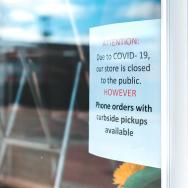The coronavirus is deepening divides in the United States along income, race and gender lines—with lower-income women suffering the greatest losses.
New research from the University of Chicago examines how COVID-19 outbreaks have disproportionately harmed those who were already struggling before the pandemic. According to an ongoing survey of U.S. households, over 57% of women making less than $30,000 have lost income during the first month of crisis.
But among men and women making at least $45,000 a year, fewer than 30% reported losing income during that same time span.
“The new research underscores the importance of policies that do more to relieve the impact of COVID-19 on lower-income households, who are being disproportionately affected,” said Marianne Bertrand, the Chris P. Dialynas Distinguished Service Professor of Economics at the Unviersity of Chicago Booth School of Business. “Our data support that this crisis is anything but ‘a great equalizer’. It is dramatically amplifying income inequality in America.”
Bertrand is the faculty director at the Rustandy Center for Social Sector Innovation and at the UChicago Poverty Lab, which have partnered with the AmeriSpeak Panel team at NORC at the University of Chicago to conduct a weekly series of polls through mid-May. In the first of six surveys, conducted April 6 to 11, AmeriSpeak polled over 1,400 representative households across the country.
The research aims to understand how Americans are reacting to the novel coronavirus; how they are coping with social distancing; and how this unprecedented crisis may be impacting disparities across groups and changing views about the economy, politics, the role of government and the country’s future.
Despite disparities in impact, researchers also found wide agreement for supporting state and national social-distancing measures—apart from lower-income Republicans, who are less willing to comply.
The household survey is the second in a series of ongoing COVID-19 research projects undertaken by the Rustandy Center and the Poverty Lab that are measuring on a weekly basis the pandemic’s impact on employment and on small and medium-sized businesses.
Other key initial findings from the household impact survey include:
• The coronavirus crisis is impacting Americans unequally depending on their income, gender and race. Lower-income Americans, especially women, were more likely to experience a drop in their incomes due to changes to their employment status already in the first month of the crisis. In addition, 42% of non-white workers making $45,000 to $75,000 reported losing income—compared to just 26% of white workers in the same income bracket.
• The crisis is taking a toll on the mental and emotional wellbeing of many Americans, but low-income households are most concerned about jobs, income stability, and health care coverage. More than half of low-income respondents reported being worried about losing their job, compared to less than 20% of higher-income Americans.
• Most Americans are supportive of stay-at-home COVID-19 measures, but support is influenced by their sources of COVID-19 information. About 20% of Americans believe that the media is exaggerating the gravity of the coronavirus outbreaks. Those respondents were somewhat more likely to get COVID-19 news from President Donald Trump, and less likely to get that news from government agencies. In comparison, 51% believe that the media representation is accurate, and 21% believe the media is underreporting the gravity of the situation.
• Almost 40% of Americans do not believe that the COVID-19 outbreak is the most pressing policy priority over the next 12 months. However, respondents across political parties selected COVID-19 as one of their top three priorities, along with unemployment and the upcoming presidential elections.
“These early results will inform policymakers as they weigh new or expanded support programs in response to COVID-19,” said Carmelo Barbaro, executive director of the UChicago Poverty Lab. “Because this is a longitudinal survey, we’ll be able to track these results over time and measure how household attitudes and outlooks are changing as the pandemic and relief efforts unfold.”
One of five Urban Labs based at the Harris School of Public Policy, the University of Chicago Poverty Lab partners with civic and community leaders to study and address barriers to social mobility and racial equity. The Rustandy Center for Social Sector Innovation is the destination at Chicago Booth for people committed to helping solve complex social and environmental problems.
“The NORC AmeriSpeak team is proud to contribute to the University of Chicago’s efforts to advance our country’s understanding of the ongoing economic, social, and other impacts of the COVID-19 pandemic,” said J. Michael Dennis, senior vice president at NORC at the University of Chicago and executive director of AmeriSpeak. “Our AmeriSpeak Panel provides the representative sample of U.S. households for tracking the pandemic’s effects on the same households over the next few weeks, hopefully providing decision-makers vital and timely data on the country’s economic health and social capital.”












 —Prof. Kunle Odunsi
—Prof. Kunle Odunsi
